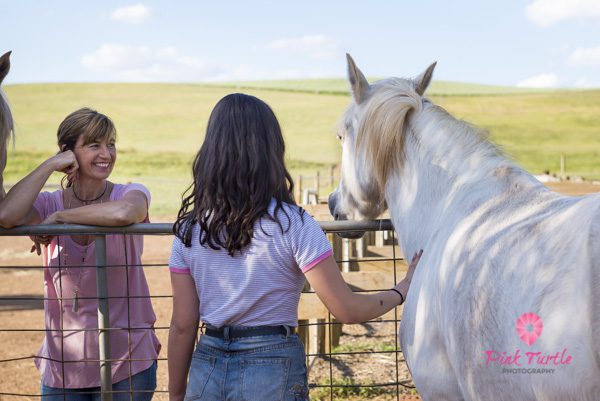
Learn how to become an equine assisted therapist in Australia. Explore qualifications, training, equine knowledge and horse experience, and the professional skills needed for this rewarding specialist practice.
If you’ve ever felt the calming and healing presence of a horse and thought, “I’d love to help people through this kind of therapy,” you might be interested in a career that incorporates horses in counselling and psychotherapy. It’s a growing practice in Australia, and across the world, that combines counselling, therapy and mental health support with the unique connection between humans and horses. But how do you become an equine therapist? Here’s a simple guide to the main steps, and the correct terminology – it is called Equine Assisted Therapy or more specifically, Equine Assisted Psychotherapy. (This is not the same as Equine Assisted Physical Therapy or Equine Assisted Occupational Therapy …but that’s for another blog!)
1. Start with a Counselling, Psychotherapy, or Allied Health Qualification
Before you can specialise in equine assisted therapy, you’ll need a recognised qualification in counselling, psychotherapy or an allied health profession. This could be psychology, social work, or mental health occupational therapy which legally include therapy or psychotherapy in their scope of practice. Many qualifications require degreed, postgraduate education, however counselling qualifications can begin at a Diploma-level qualification.
The key is to have the qualification, and to hold current registration with a professional body within the discipline such as Psychotherapy and Counselling Federation of Australia (PACFA), the Australian Association of Social Work (AASW), the Australian Counselling Association (ACA) and so on. This ensures you’re meeting professional standards and gives clients confidence in your therapeutic work.
2. Train in Equine Assisted Psychotherapy
Once you have your base qualification and registration, the next step is to enrol in a specialised program in Equine Assisted Psychotherapy. Training usually combines self-directed learning with in-person workshops, giving you both the theory and the practical experience you need.
These courses don’t just teach you techniques—they immerse you in the unique way horses can support human healing and growth. You’ll learn how to create safe, ethical, and effective therapy sessions that respect both the client and the horse.
The Equine & Animal Assisted Psychotherapy Institute teaches a specialist theory of change (ToC) and practice methodology which includes a comprehensive deep dive into the role of the horse as change agent and teaches student practitioners exactly how to do mutually beneficial work with horses and clients (with horses at liberty, on-line, with creative equipment and led-mounted sessions). The Institute will teach and assess the above ToC, plus essential equine knowledge, equine skills, core principles, core practices, all whilst supporting the development of vital professional and personal qualities.
3. Build Equine Knowledge and Horse Skills
To work in this specialist practice, it’s not enough to simply “like” horses—you need to know them deeply. Understanding equine science, their behaviour, body language, and their needs is at the heart of safe and ethical practice. Developing skills in horse care, horse training and horse safety is essential.
For newer horse lovers, spending time observing horses, volunteering or working alongside experienced and ethical horse people is invaluable. The more time you spend with horses, the more confident and intuitive you’ll become in recognising their communications and species-specific needs and creating a safe environment for clients and horses.
4. Understand the Core Principles
Equine Assisted Psychotherapy is about more than just bringing people and horses together. Therapists need to have a clear theoretical perspective of equine assisted practice, specific facilitation practice skills, comprehensive knowledge base and honour equine welfare, wellbeing, consent and enrichment in order to maintain an ethical scope of practice. This ensures the work is legally, ethically and professionally competent, and every interaction is effective, respectful and safe.
You’ll learn about the therapeutic relationship and therapeutic system- the system between the therapist-horse/s-client-environment -and how to work relationally, to manage challenge, be trauma-informed and committed to hold a supportive space for clients, horses and all beings included in sessions.
5. Develop Professional Qualities
Great equine assisted psychotherapists do more than know their theory and practice with clients and horses. They’re self-aware, grounded, and able to regulate their own emotions while supporting others. They are sensitive, attuned, compassionate and most importantly present. Well trained practitioners have strong skills in remaining open, curious, creative, flexible and resilient—the ability to face difficult material and navigate the ups and downs of human-animal interactions, bonds and relationships in a professional and genuinely caring manner.
The Rewarding Path Ahead
Becoming an equine assisted psychotherapist takes commitment, study, and plenty of time and practice. But for those who feel drawn to this work, it can be an incredibly rewarding path that nourishes the body, soul and mind. You’ll be combining professional skills with the healing presence of horses, supporting people to grow, heal, and connect in ways that office-based, indoor and online therapy alone sometimes can’t achieve.
If you’re passionate about both people and horses, equine assisted psychotherapy may be the perfect specialist career extension for you.
Discover more at www.equinepsychotherapy.net.au
More about EAAPI
Learn how change happens through presence, connection, and many diverse mechanisms with horses and humans! Join an international community of passionate professionals who share a deep love of horses and a calling to do meaningful, transformative work.
If you’re ready to expand your practice, step beyond the four walls, and support people in a truly powerful way with horses — this is your path. Our equine assisted psychotherapy training and education includes
- PACFA-accredited and AASW & ACA aligned professional development
- In-Person & Online Learning Options
- Trauma-informed, somatic-focused, and relationally oriented practices
- Taught by Internationally renowned Industry Leaders
- Gives the Certificate and access to professional Insurance that you need to begin your equine assisted practice with confidence today!
